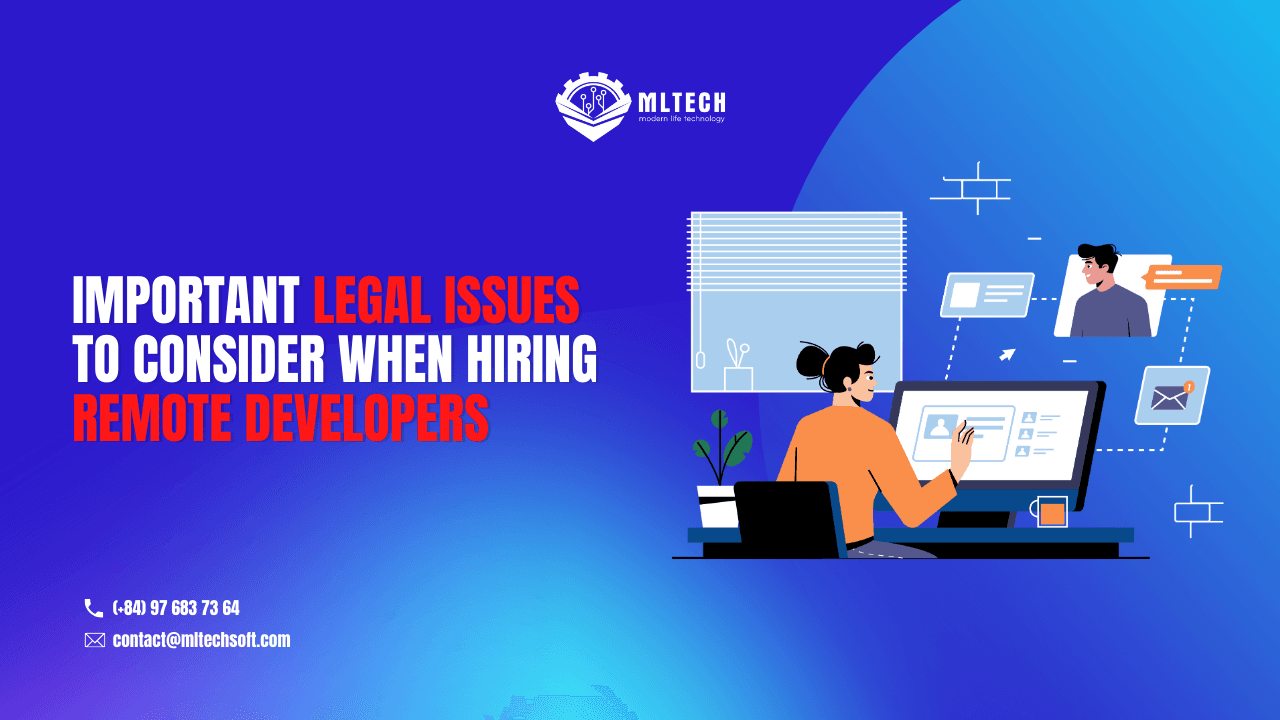Scroll down for more
Important legal issues to consider when hiring remote developers

Hiring remote developers is a great idea for many companies. However, there are some challenges to consider. You did your homework, we know the cost of remote development work. They understand the benefits it brings to their business and are willing to hire a team that can be managed remotely.
However, there are some challenges ahead. Remote hiring presents at least 10 challenges, listed below. So if you're looking to hire a remote developer, it's time to get down to business, identify the real problem, and find a solution.
1. Ensure Local Labor Law Compliance
Understanding this is important. Because ignorance of the law is no excuse for breaking the law. Labor law stipulates workers' rights and benefits, as well as certain conditions such as weekly rest periods, contributions, etc.
Employers must take care to recruit the best candidates for each season, apply and follow internal policies, and closely monitor wage practices to ensure compliance with state and federal laws.
Employers who carefully review their seasonal employment practices can take excellent steps to protect themselves from liability.

2. Establishing Your Own Company to Hire Remote Developers
Unlike office workers, remote workers are part of a team but interact with it virtually. They may be from another country and may not know their employer personally. This type of interaction is often associated with freelancing. However, all full-time employees can work remotely, not just freelancers.
Recruitment is our responsibility as we have access to all the talent in the world. By following these steps, you can find the ideal candidate for your business.
Identify your company's needs:
Every company has different concepts, products, services, and organizational structures. You need to understand how remote developers can help bring your startup closer to your goals.

Please select a cooperation model:
The next step is to determine what level of collaboration you are comfortable with. Can you run a freelance software developer while still taking the initiative as a project manager? Is it better to hire a dedicated team where an outsourced team fully manages development? You decide to delegate tasks, coordination, and costs.
Decide where to hire remote developers from:
Depending on the remote developer's location, you may have to deal with cultural and language differences, guesswork, and simple adjustments.
Talent pool access:
Now that you have decided on a specific country, you should start recruiting from different talent pools.
For example, if you're looking for a freelancer, here are some of the best places to start. Alternatively, you can reach out to reputable app development companies such as Groove Technology through blog posts like this one.
Make sure you're getting the right professionals:
Regardless of the platform you choose, you'll need to assess potential candidates' skills. The freelancer portal allows you to review developer profiles and work experience.
The interview concludes:
There's nothing like a face-to-face interview to get a sense of whom you're working with. Schedule video calls with candidates, whether they're freelance developers or product managers. You'll know if you can communicate effectively with them and if they have a design process that makes you happy.
Entry start:
Once you have determined your shortlist of candidates, you can sign an employment contract and formally hire them. We clearly define the expectations of both parties and provide all the requirements necessary to start work.
3. Taxation and Other Concerns
The question related to remote work is whether the contract imposes tax or social security obligations on the employee or withholding obligations on the employer.
The answer depends on whether there is a double tax treaty between the employer's country of residence and the employee's country of residence. If no double taxation treaty applies, taxation usually begins on the first day the worker begins employment in the country.
Therefore, depending on local regulations, there may be registration requirements for employers to withhold payroll tax, social security, or both.

Health insurance cards are easy to obtain in your home country but are often forgotten. If the procedures are not complied with or there is no bilateral or other agreement, double social security contributions will be required both in the employer's country and in the worker's temporary residence.
A recently transferred worker is unlikely to qualify for social security benefits in the new host country, as most countries require him to have a minimum contribution period of five years or more.
4. How do you handle compensation when working with remote developers?
Once you've found remote developers to hire, you'll need to subcontract them and pay them a fixed amount (salary) each month. Then you don't have to pay taxes on it. Additional benefits such as vacation pay, stock options, etc. can also be included in the contract.

Developers are taxable in their country of residence on payments received. You can pay as an individual or freelancer, or register a legal entity like a sole proprietorship. This can be advantageous for taxation in most countries.
If you are registering a legal entity, the contract must be between the customer and the legal entity, not the individual. The developer will then have to submit their bank details so that monthly payments can be processed.
5. Ownership of Work Product
Under the law, as a general rule, copyright in the work of an individual employee or independent contractor belongs to that individual, unless an exception applies.
The "work for employment" doctrine is an exception to this rule. According to the work-for-hire principle, the employer owns the copyright in the work created by the employee in the ordinary course of work.
Further, under the Work for Hire doctrine, copyright in certain types of works created under an express written agreement between the author and the person ordering those works is vested in the party ordering those works.

Accordingly, an employer considers any work performed by an employee on behalf of the employer to be within the employee's normal job duties. Any work product produced in the performance of these duties shall be considered by the employee property must be clearly identified in the employee handbook.
In addition, when communicating with employees about certain projects on which work may be carried out (especially projects that may be carried out in whole or in part outside of normal business hours and/or from remote locations), Employment The Lord needs to clarify that: The project is within the employee's normal job function and all intellectual property created as part of the project is the property of the employer.
Finding remote developers is easier said than done. The hiring process is as much an art as it is a science, and finding the right candidate takes time.
Despite these challenges, the results are often worth it. This allows companies to develop products faster and cheaper, with much less stress and effort. Every company wants it!
Get our blog
Want the latest and greatest from our blog straight to your inbox? Chunk us your details and get a sweet weekly email.
Read more in our blog

Project Management
The Rise of AI-Generated Code: Opportunities & ChallengesExplore how AI-generated code is transforming programming with tools like GitHub Copilot and AlphaCode. Learn about the opportunities it offers—faster development, accessibility—and the challenges like security and ethics we must address.

Project Management
The Impact of Dynamic Pricing on Customer BehaviorExplore the impact of dynamic pricing on customer behavior and learn how to implement effective pricing strategies.

Project Management
Focus in Scrum: Keeping Your Team on TrackDiscover effective strategies to maintain focus within your Scrum team, overcome common challenges, and boost productivity.
MLTECH SOFT